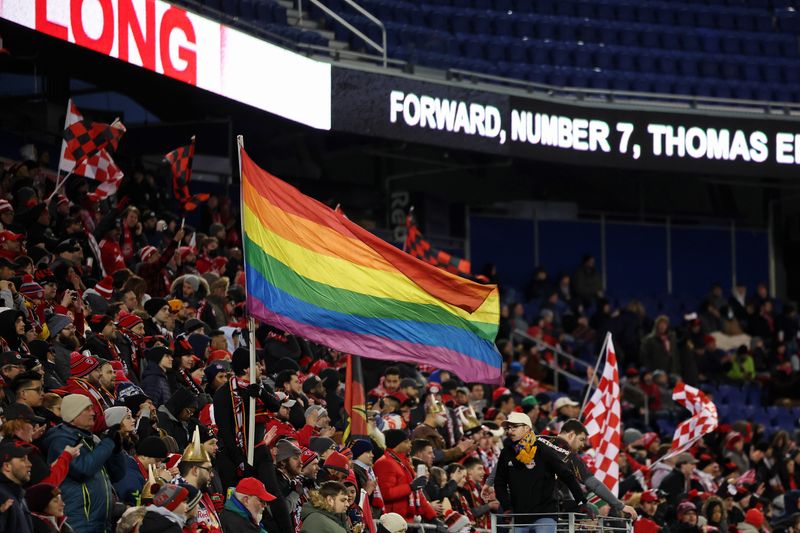By James Oliphant and Maria Caspani
– Republican governors in Utah and Indiana this week rejected legislation banning transgender athletes from competing in girls’ sports, pushing back against a rising tide of similar Republican-sponsored legislation nationwide.
But the vetoes of those governors appear to be among the solitary voices in a party that has become increasingly fixated on polarizing cultural issues involving race, sex and gender as a cudgel to win over suburban and rural voters and regain power in November’s congressional elections.
Utah lawmakers on Friday voted to override Governor Spencer Cox’s veto, joining 11 other states that have enacted laws banning transgender girls from participating in girls’ sports since 2020, according to the Equality Federation, which tracks legislation that targets lesbian, gay, bisexual, transgender and queer people.
The veto in Indiana also is expected to be overridden by Republicans in the state’s legislature, making the actions by Indiana Governor Eric Holcomb and Utah’s Cox largely symbolic.
“Saving women’s sports is now a litmus test for Republicans,” said Terry Schilling, president of the American Principles Project, a conservative group that has made state high school transgender bans central to its advocacy. “These governors just shot themselves in the foot for no good reason.”
The issue gained new resonance this month when collegiate swimmer Lia Thomas became the first openly trans athlete to win a Division I championship in any sport. Conservatives have used her victory as a rallying cry for more restrictive legislation.
Republican Governor Ron DeSantis of Florida, who is up for re-election and has become perhaps his party’s most high-profile cultural warrior, this week declared the second-place finisher in Thomas’ race the actual winner, saying the NCAA was “perpetuating a fraud” and undermining the integrity of women’s sports.
The U.S. Centers for Disease Control and Prevention estimated in 2019 that just 1.8% of high school students in the country are transgender, and the Human Rights Campaign has said that, according to surveys, only about 12% play on girls’ sports teams.
In Utah, Cox called the issue of transgender students participating in sports “one of the most divisive of our time” and said he wanted to approach the issue with compassion. He expressed concern for the mental health of trans youths, who, he said, simply want to participate in sports as a means of belonging.
Cox said he found only one instance of a transgender student playing on a girls’ high school team in Utah.
“Rarely has so much fear and anger been directed at so few,” Cox wrote in a letter explaining his veto. “I don’t understand what they are going through or why they feel the way they do. But I want them to live.”
POLITICAL RISK
In vetoing the bills, both Cox and Holcomb suggested the restrictions were unnecessary and would invite costly lawsuits.
Beyond Utah and Indiana, governors in three other states have vetoed similar bans, although South Dakota then enacted a revised law, according to the Equality Federation.
Fran Hutchins, the organization’s executive director, called the legislative pushes a ploy to drum up support ahead of the midterm elections, when Republicans could win back a majority in the Senate and the House of Representatives.
“I really hope that the Republican vetoes are the beginning of a sea change in the way that conservatives are thinking about this,” Hutchins said. “But I fear that we’re going to see this rhetoric continue beyond legislative sessions and into the elections.”
Chris Wilson, a Republican pollster who consults on Senate and gubernatorial campaigns, said that Democrats oppose such bans at their peril, saying they are favored by some independents and Democrats who believe it is unfair to allow transgender students to compete in girls’ athletics.
A May 2021 poll by Gallup found that 62% of Americans said trans athletes should only be allowed to play on sports teams that correspond with their birth gender, while 34% say they should be able to play on teams that match their gender identity.
Wilson said Democrats who vote against such bans could see political blowback similar to the controversy over calls by progressives to de-fund police departments, a position that has largely been rejected by a majority of voters nationwide.
Republicans could face political risks as well.
In vetoing the Indiana bill, Holcomb may have wanted to avoid the firestorm that arose in 2015 when then-governor Mike Pence signed a controversial religious freedom bill.
And in 2016, North Carolina Governor Pat McCrory, a Republican, lost his re-election bid after the state’s so-called “bathroom bill” requiring transgender people to use the bathroom of their original sex triggered a backlash that damaged the state’s economy.
(Reporting by Maria Caspani and James Oliphant; Editing by Colleen Jenkins and Aurora Ellis)
